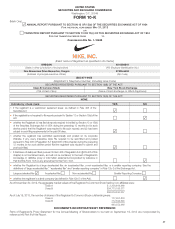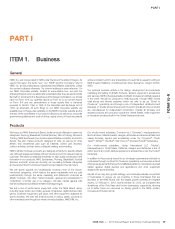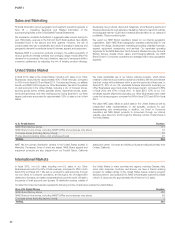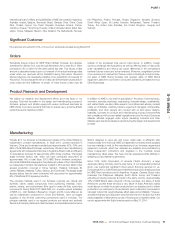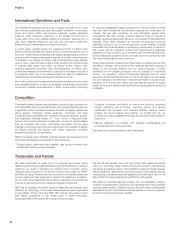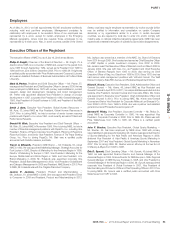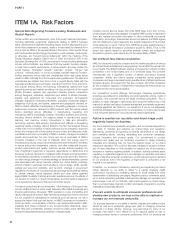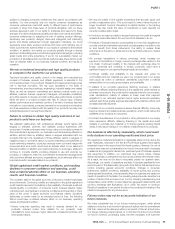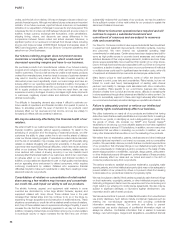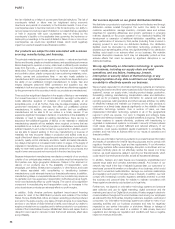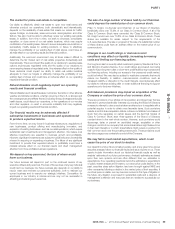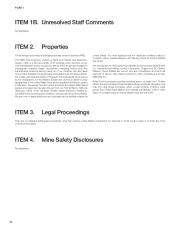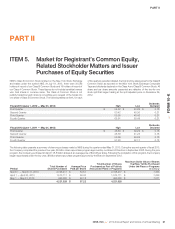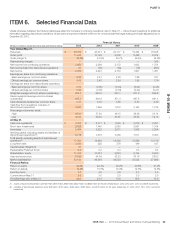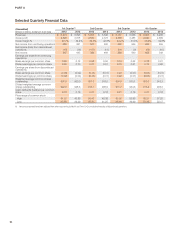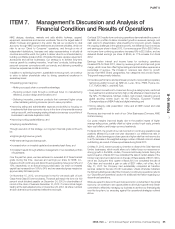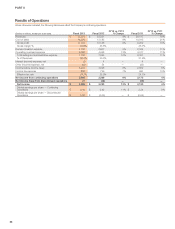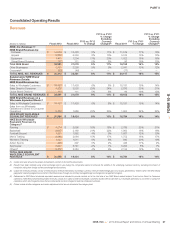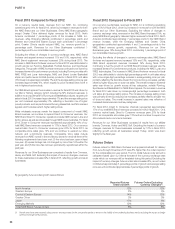Nike 2013 Annual Report Download - page 13
Download and view the complete annual report
Please find page 13 of the 2013 Nike annual report below. You can navigate through the pages in the report by either clicking on the pages listed below, or by using the keyword search tool below to find specific information within the annual report.PART I
the risk of default by or failure of counterparty financial institutions. The risk of
counterparty default or failure may be heightened during economic
downturns and periods of uncertainty in the financial markets. If one of our
counterparties were to become insolvent or file for bankruptcy, our ability to
recover losses incurred as a result of default or our assets that are deposited
or held in accounts with such counterparty may be limited by the
counterparty’s liquidity or the applicable laws governing the insolvency or
bankruptcy proceedings. In the event of default or failure of one or more of our
counterparties, we could incur significant losses, which could negatively
impact our results of operations and financial condition.
Our products are subject to risks associated with overseas
sourcing, manufacturing, and financing.
The principal materials used in our apparel products — natural and synthetic
fabrics and threads, plastic and metal hardware, and specialized performance
fabrics designed to repel rain or snow, retain heat, or efficiently wick moisture
away from the body — are available in countries where our manufacturing
takes place. The principal materials used in our footwear products — natural
and synthetic rubber, plastic compounds, foam cushioning materials, nylon,
leather, canvas and polyurethane films — are also locally available to
manufacturers. Both our apparel and footwear products are dependent upon
the ability of our unaffiliated contract manufacturers’ to locate, train and
employ adequate personnel. NIKE contractors and suppliers buy raw
materials in bulk and are subject to wage rates that are oftentimes regulated
by the governments of the countries in which our products are manufactured.
There could be a significant disruption in the supply of fabrics or raw materials
from current sources or, in the event of a disruption, we might not be able to
locate alternative suppliers of materials of comparable quality at an
acceptable price, or at all. Further, there may be wage increases, whether
government mandated or otherwise, that affect our unaffiliated contract
manufacturers. In addition, we cannot be certain that our unaffiliated
manufacturers will be able to fill our orders in a timely manner. If we
experience significant increases in demand, or reductions in the availability of
materials, or need to replace an existing manufacturer, there can be no
assurance that additional supplies of fabrics or raw materials or additional
manufacturing capacity will be available when required on terms that are
acceptable to us, or at all, or that any supplier or manufacturer would allocate
sufficient capacity to us in order to meet our requirements. In addition, even if
we are able to expand existing or find new manufacturing or sources of
materials, we may encounter delays in production and added costs as a
result of the time it takes to train suppliers and manufacturers in our methods,
products, quality control standards, and labor, health and safety standards.
Any delays, interruption or increased costs in labor or wages, or the supply of
materials or manufacture of our products could have an adverse effect on our
ability to meet retail customer and consumer demand for our products and
result in lower revenues and net income both in the short and long-term.
Because independent manufacturers manufacture a majority of our products
outside of our principal sales markets, our products must be transported by
third parties over large geographic distances. Delays in the shipment or
delivery of our products due to the availability of transportation, work
stoppages, port strikes, infrastructure congestion, or other factors, and costs
and delays associated with consolidating or transitioning between
manufacturers, could adversely impact our financial performance. In addition,
manufacturing delays or unexpected demand for our products may require us
to use faster, but more expensive, transportation methods such as air freight,
which could adversely affect our profit margins. The cost of oil is a significant
component in manufacturing and transportation costs, so increases in the
price of petroleum products can adversely affect our profit margins.
In addition, Sojitz America performs significant import-export financing
services for most of the NIKE Brand products sold outside of the United
States, Europe, Middle East, Africa, and Japan, excluding products produced
and sold in the same country. Any failure of Sojitz America to provide these
services or any failure of Sojitz America’s banks could disrupt our ability to
acquire products from our suppliers and to deliver products to our customers
outside of the United States, Europe, Middle East, Africa, and Japan. Such a
disruption could result in canceled orders that would adversely affect sales
and profitability.
Our success depends on our global distribution facilities.
We distribute our products to customers directly from the factory and through
distribution centers located throughout the world. Our ability to meet
customer expectations, manage inventory, complete sales and achieve
objectives for operating efficiencies and growth, particularly in emerging
markets, depends on the proper operation of our distribution facilities, the
development or expansion of additional distribution capabilities, and the
timely performance of services by third parties (including those involved in
shipping product to and from our distribution facilities). Our distribution
facilities could be interrupted by information technology problems and
disasters such as earthquakes or fires. Any significant failure in our distribution
facilities could result in an adverse effect on our business. We maintain
business interruption insurance, but it may not adequately protect us from
adverse effects that could be caused by significant disruptions in our
distribution facilities.
We rely significantly on information technology to operate
our business, including our supply chain and retail
operations, and any failure, inadequacy, breach,
interruption or security failure of that technology or any
misappropriation of any data could harm our reputation or
our ability to effectively operate our business.
We are heavily dependent on information technology systems and networks,
including the Internet and third-party hosted services (“information technology
systems”), across our supply chain, including product design, production,
forecasting, ordering, manufacturing, transportation, sales, and distribution,
as well as for processing financial information for external and internal
reporting purposes, retail operations and other business activities. Our ability
to effectively manage and maintain our inventory and to ship products to
customers on a timely basis depends significantly on the reliability of these
information technology systems. Over a number of years, we have
implemented information technology systems in all of the geographical
regions in which we operate. Our work to integrate and enhance these
systems and related processes in our global operations is ongoing. The failure
of these systems to operate effectively, problems with transitioning to
upgraded or replacement systems, or a breach in security of these systems
could cause delays in product fulfillment and reduced efficiency of our
operations, could require significant capital investments to remediate the
problem, and may have an adverse effect on our results of operations and
financial condition.
We also use information technology systems to process financial information
and results of operations for internal reporting purposes and to comply with
regulatory financial reporting, legal and tax requirements. If our information
technology systems suffer severe damage, disruption or shutdown and our
business continuity plans do not effectively resolve the issues in a timely
manner, we could experience delays in reporting our financial results, which
could result in lost revenues and profits, as well as reputational damage.
In addition, hackers and data thieves are increasingly sophisticated and
operate large scale and complex automated attacks. Any breach of our
network may result in the loss of valuable business data, our customers’ or
employees’ personal information or a disruption of our business, which could
give rise to unwanted media attention, damage our customer relationships
and reputation and result in lost sales, fines or lawsuits. In addition, we must
comply with increasingly complex regulatory standards enacted to protect
this business and personal data. An inability to maintain compliance with
these regulatory standards could subject us to legal risks.
Furthermore, we depend on information technology systems and personal
data collection and use for digital marketing, digital commerce and the
marketing and use of our Digital Sport products. We also engage in electronic
communications throughout the world between and among our employees
as well as with other third parties, including customers, suppliers, vendors and
consumers. Our information technology systems are critical to many of our
operating activities and our business processes and may be negatively
impacted by any service interruption or shutdown. Misuse or leakage of
personal information could result in a violation of data privacy laws and
regulations and damage our reputation and credibility and have a negative
impact on revenues and profits.
58


